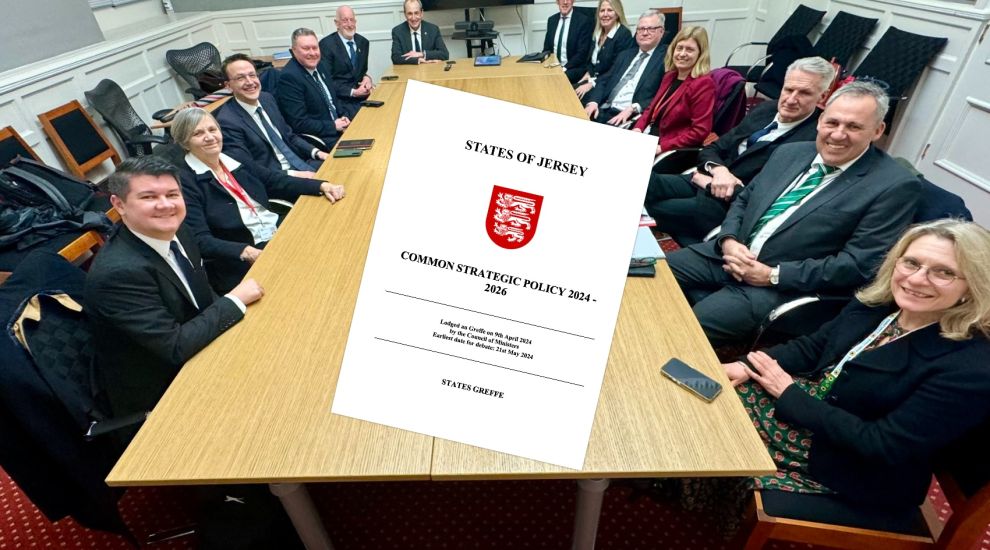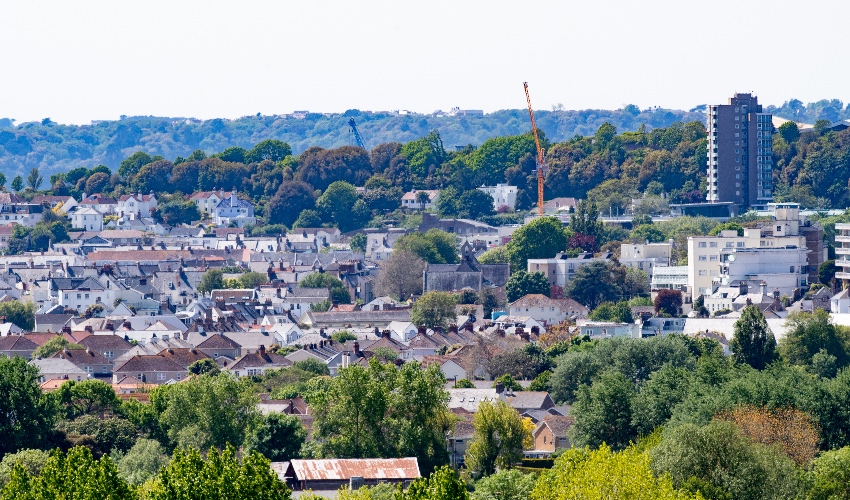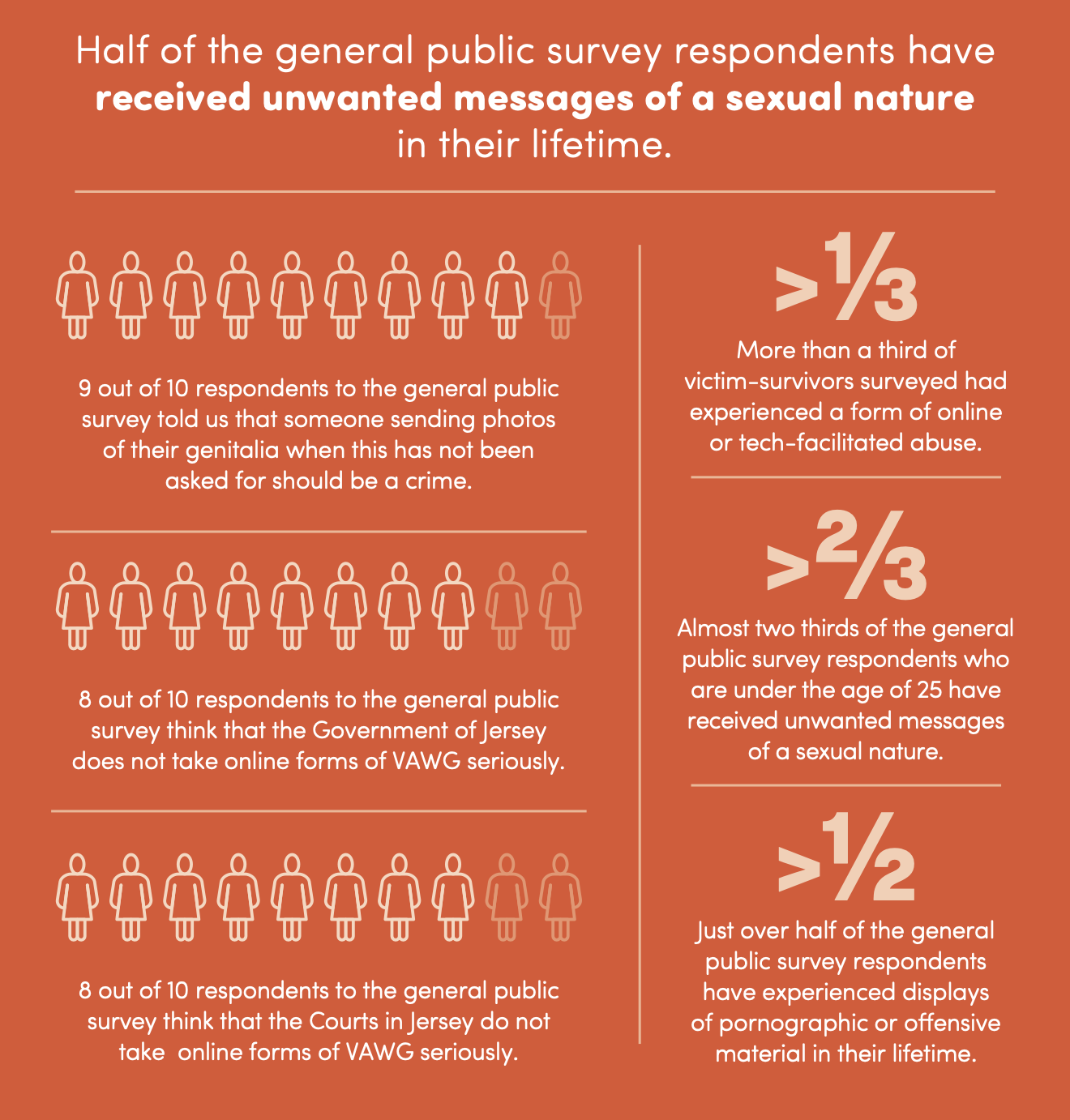


Fast-tracking minor planning applications, providing free school meals, revitalising town, and getting to work on the hospital are among the key pledges made by the government in a new policy document.
Chief Minister Lyndon Farnham and fellow Ministers have outlined their roadmap for the next two years, covering the areas in which they want to make progress ahead of the island’s next general election.
The Common Strategic Policy, published yesterday and due to be debated by the States Assembly on 21 May, focuses on tackling cost-of-living pressures and extending nursery and childcare provision.

Pictured: Lyndon Farnham became Chief Minister in January following a successful vote of no confidence in Kristina Moore.
It also features key health-related priorities, most notably the commencement of the island’s long-awaited new hospital and reducing GP fees.
Action is also outlined to implement the recommendations of the Violence Against Women and Girls Taskforce report, to revitalise St Helier, cut red tape and other “barriers to business”, and to reform the Planning service.
Express took a look at the key priorities...
Having played such a prominent role in the Future Hospital project during his time in government before the 2022 General Election, it is unsurprising that the scheme is a key part of the Chief Minister’s policy agenda for the next two years.
Although the project has changed significantly from the one Deputy Farnham spearheaded, getting spades in the ground and bricks laid at Overdale prior to the 2026 election is a firm commitment from the government.
The Common Strategic Policy pledges that: “Beginning work on the new hospital is an important step to providing the quality and level of care required by islanders, delivering a purpose-built medical facility for Health staff, and giving confidence in healthcare for future generations.”

Pictured: Getting spades in the ground and bricks laid at Overdale prior to the 2026 election is a firm commitment from the government.
Work at Overdale is intended to lead into further health-related projects, including replacing outpatient and day-care services and improvements to mental-health facilities and the provision of therapies.
The second major initiative under this heading relates to reducing GP fees.
The strategy states: “Islanders are still experiencing the impact of increased living costs and... patient charges are creating a real barrier to some islanders accessing health services.
“We have already reduced GP fees for people on the Health Access Scheme, and are planning to increase the subsidy for GP visits.”
Challenges relating to the cost of living have become part of the narrative in Jersey since the island emerged from the Covid pandemic, so inevitably the word “affordable” is used liberally in the policy document: 11 instances represents one for every page of text.
The government underlines its determination to bring the minimum wage to two-thirds of the median wage, saying that this priority will support employees in critical industries like retail, hospitality and agriculture with higher wages. It will also, the policy explains, help support a thriving and more productive local economy and help us to attract workers to alleviate labour shortages.
Naturally, resolving the housing crisis features highly in this.
— Deputy Sam Mézec (@SamMezecJsy) April 9, 2024
This is my top priority and we have turbo-charged our response since the first day we were appointed. A marked change after years of intransigence. pic.twitter.com/Vmlk9zJ6Eo
With housing costs representing a major proportion of many islanders’ outgoings, the policy seeks to reduce this burden through implementing the new Rented Dwellings Licensing Scheme, and introducing a new Residential Tenancy Law.
Meeting this priority will provide the certainty and protection both renters and landlords need, the government argues, as well as tackling rent inflation, and – as more social housing supply is provided – making the benefits of social housing accessible to more islanders.
There is also a pledge to keep government fees, duties and charges as low as possible to help islanders with the cost of living in 2025. Further details will be shared in the next Government Plan, due to be published in the autumn.
Two of the 12 policy priorities come under this heading.
Firstly the government wants to revitalise St Helier to provide improved schools and youth facilities, enhanced public spaces, and to make the capital more accessible and easier to visit for walkers and cyclists. Improvements to the town markets are also being lined up in order to “support retail vitality and vibrancy”.
The policy notes: “Planning for a vibrant town centre is critical to the sustainable development of the island, and will give us the vision for our capital that will continue to provide land and opportunities to meet most of the island’s future development needs.”

Pictured: “Planning for a vibrant town centre is critical to the sustainable development of the island."
The final topic relates to the reform of the planning service to ensure it is more efficient and effective, and offers better value, something described as being “of fundamental importance to meet the community’s development needs and to deliver the government’s priorities”.
Changes will include developing and introducing a fast-track service process for minor applications and achieving improvements in customer service, as well as offering better planning guidance and exploring the relaxation of planning control.
The stated intention is “to support the efficient delivery of housing and other developments and provide increased certainty to developers, alongside a better service to islanders”.
The new Council of Ministers has committed to continuing the work begun during the previous government when it comes to extending nursery and childcare provision.
Former Assistant Children’s Minister Louise Doublet had said that making childcare more affordable was her “highest priority” while in office, and Scrutiny member Deputy Catherine Curtis had attempted to amend the Government Plan to ensure that universal and affordable nursery provision and early years support was explored for nine-month- to three-year-olds.
The new government has prioritised ensuring that any increase in offer to parents is in line with an increase in nursery and childcare spaces and must be done in a “co-ordinated way”.
The document said: “While the intention is to move towards a universal offer for two- to three-year-olds, we will start by extending nursery and childcare provision to children aged two to three years with additional needs.
“To help increase nursery spaces, we will pilot ways to access unused spaces in our primary school nurseries, and we will review the availability of spaces in St Helier – where the demand is highest – and also across the island.
“We will work with the sector to improve recruitment and retention, and to incentivise training and development for this critical profession.”

Pictured: "We will start by extending nursery and childcare provision to children aged two to three years with additional needs."
Deputy Doublet said that the content was “brief” but she was pleased to see a continuation of policies “that were already evolving”, including the pilot project which she said already has several school nurseries on board.
She said: “To use that nursery capacity differently is going to be really important in offering flexibility and excellent provision to families.”
She is due to ask a question in the States Assembly next week “to draw out further details”, she added, about whether funding should be sought in this autumn’s Government Plan.
Nutritious school meals will also be rolled out to all States primary schools by December 2024, completing a pilot programme already under way.
And, to support ambitions of the Future Economy Programme, Ministers will prioritise skills development, promoting apprenticeships, targeted skills development schemes, and implementing “sustainable” Higher Education Student Finance.
Before the publication of the Common Strategic Policy, Chief Minister Lyndon Farnham had already expressed his personal wish to see as many of the recommendations from the Violence Against Women and Girls Taskforce report implemented before the end of his term as possible.
Home Affairs Minister Mary Le Hegarat last month unveiled detailed plans to eradicate issues of safety and security for women in Jersey – marking a major step forward for gender equality in the island.

Pictured: Almost two-thirds of the VAWG survey respondents under the age of 25 said they had received unwanted messages of a sexual nature.
And before the end of this year, significant changes are scheduled to be made to the island’s Domestic Abuse Law to increase protection for victims, and funding has been secured for an end-to-end review of the criminal-justice system.
Deputy Le Hegarat also pledged to bring forward specific offences in relation to cyber-flashing, stalking and cyber-stalking and explore the possibility of a new offence of sexual harassment in a public place before the end of 2025.
The document published yesterday reiterated these commitments and plans.
The Barriers to Business report, published in December, found that a lack of collaboration between the government and businesses, complex bureaucracy, and unclear strategies was hindering the island’s competitiveness.
The government’s failure to act on the report’s recommendations would result in “reputational damage” and “continuing downward economic trajectory”, it said.

Pictured: "We will reduce red tape and lower barriers across government, as recommended in the Barriers to Business report."
The Common Strategic Policy has acted on those findings, saying: “We will reduce red tape and lower barriers across government, as recommended in the Barriers to Business report.
“We will work with businesses to tackle private-sector labour shortages where they are made worse by government policies or processes.
“We will ensure a secure digital ecosystem with a new Cyber Security Law and strategy to attract investment and facilitate innovation.
“We will also strengthen Jersey’s reputation as an attractive and competitive place to work and do business by providing incentives for businesses to be based here, following changes to the international tax regime.
“By meeting this priority, we will ensure that government interactions are simple and efficient for new and existing businesses, entrepreneurs, social enterprises and the third sector, and maintain a strong economy where all can prosper.”
Comments
Comments on this story express the views of the commentator only, not Bailiwick Publishing. We are unable to guarantee the accuracy of any of those comments.